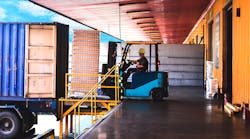I have a fear that we are going to tire of the word "sustainable" before we actually achieve sustainability in transport packaging. The word will be overused, like "system," and our brains will click into cruise control at the mention of sustainable packaging.
So, before we lose sight of what sustainability is really about, let's search for some examples of sustainable containers that will help define the term; something we can refer back to when the meaning has blurred.
Sustainable can mean finding different and better uses for what you have. Reusing what you've already paid for; or buying with an eye toward multiple uses makes sense— cents.
Here's a perfect example. Creating a sustainable container, or being green, does not mean dumping all the petroleum-based things in your life in favor of products made from renewable resources.
The Utz Group, a manufacturer of plastic storage and transport packaging containers and pallets, recently garnered a coveted World Star Award from the World Packaging Organization. The company has been in the transport packaging business since 1947. Its award-winning K-Box is a joint development project with its customer, the Schaeffler Group Industrial, a manufacturer of roller bearings. This patented returnable container is compatible with material handling equipment such as lift trucks and conveyors. It replaces more than 40 kinds of wooden containers that were not being returned.
Tom Schwank, general manager for the Utz Group in Columbus, Indiana, told me green is the color of money as well as the environment. "Our message has always been that you can save money if you have returnable packaging. And while there were other winners of this [World Star] award for packaging, we were the only one with returnable packaging."
He says the idea of sustainability issues often comes up in the conversation with customers, however, at the end of the day, it's about money. "Companies make decisions based on whether they'll make money. If they're going to have to pay twice as much money, just because it's environmentally friendly, it's difficult to justify," says Schwank.
He adds that people go to returnable packaging for different reasons; to save money, or improve the quality of what they're currently using. Damaged products are always the concern, so reducing the damage by improving the packaging is driving people to more sustainable packages.
"In the process [of reducing product damage with better packaging] they can also save money with returnable packaging," he says.
The K-box, and it's tempting to call it the Swiss Army knife of containers, can handle weights to 150 kg. It prevents damage and contamination to precision-made roller bearings. Its eccentric adjustment system compensates for differences in bearing heights and diameters. It can be opened and closed with no tools and is expected to make 20 trips in its lifetime.
Although transport packaging decisions are most often about money, Schwank says Utz Group had a customer with an internal packaging rule that said if the one-way package and the returnable package had the same price, the purchasing department was instructed to buy the returnable version.
So, I guess the first part of our definition for sustainable transport packaging should be: All things being equal (and they never are), choices based on environmental concerns should get the nod in today's warming global climate. Stay tuned for the rest of the definition.
Clyde Witt has been reporting on transport packaging issues and trends for more than 20 years.


